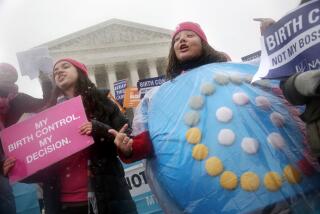Panel Calls for Guaranteed Healthcare
- Share via
WASHINGTON — The government should guarantee a core set of health benefits for all Americans by 2012 even if it means raising taxes, a nonpartisan advisory panel created by Congress has recommended.
Normally, such a recommendation might not get even a polite acknowledgment in an election-year climate in which tax increases are taboo. But the legislation that created the 15-member Citizens’ Health Care Working Group requires the president to comment and five congressional committees to hold hearings once the panel’s report is finalized.
“I think it could work as a conversation starter,” said health economist Marilyn Moon of the American Institutes for Research. “We are getting close to having a conversation on what needs to be done about healthcare, in part because people who have health security at the moment are less secure than they would like to be. People who have employer coverage are seeing it undermined.”
National polls as recently as 2005 have shown solid backing for guaranteed health insurance, even if it would mean raising taxes somewhat. Support decreases, however, if it would involve substantial tax increases or premium hikes.
The panel’s report follows Massachusetts’ decision to cover all its uninsured residents by July 2007 through a mix of employer plans, government programs and a requirement that uninsured people purchase coverage if they can afford to do so.
The recommendations of the national panel, which are to be finalized after a public comment period that ends Sept. 1, call for immediate and long-range changes.
In the near term, all Americans should have protection against catastrophic healthcare expenses, either through a government program or a private insurance plan, the panel recommended.
It also called for increased support for safety-net healthcare providers, such as community health centers, and for a concerted effort to improve quality of care and information for patients. And it suggested increasing access to hospice care for patients nearing death.
The panel said that in the long term -- by 2012 -- all Americans should have coverage for a core package of healthcare services, including preventive care, doctor visits, hospitalization and prescription drugs.
The recommendations “call for actions that will require new revenues to provide some healthcare security for Americans who are now at great risk,” said the panel’s interim report. It listed income taxes, payroll taxes, business taxes, sales taxes and taxes on alcohol and tobacco as possible sources of revenue.
“We have a long-run vision that is ambitious, but we have some interim solutions that are very practical and consistent with today’s budgets,” said panel member Richard G. Frank, a health economist at Harvard Medical School.
Members of the panel include doctors, nurses, a hospital administrator, advocates for patients and business representatives. Secretary of Health and Human Services Michael Leavitt is also a member but took no position on the recommendations.
“After 60 years of the same approach to healthcare reform, we wanted to try something different,” said Sen. Ron Wyden (D-Ore.), a sponsor of the legislation that created the panel. “In the past, influential people in Washington have made recommendations to the American people. Now, the hope is to see if a citizen-driven process can provide a general roadmap.”
Sen. Orrin G. Hatch (R-Utah), a coauthor of the legislation, said in a statement that the commission’s report was a “positive first step.”
Neither he nor Wyden has said whether they will support the panel’s specific recommendations.
Health policy analyst Greg Scandlen criticized the recommendations.
“They go in the wrong direction, it’s all top-down, command-and-control stuff,” he said.
Scandlen advocates widespread adoption of health savings accounts, which allow consumers to pay the costs of routine care while using their insurance for serious medical problems.
People can read the panel’s report and submit comments at www.citizenshealthcare.gov.
More to Read
Sign up for Essential California
The most important California stories and recommendations in your inbox every morning.
You may occasionally receive promotional content from the Los Angeles Times.










